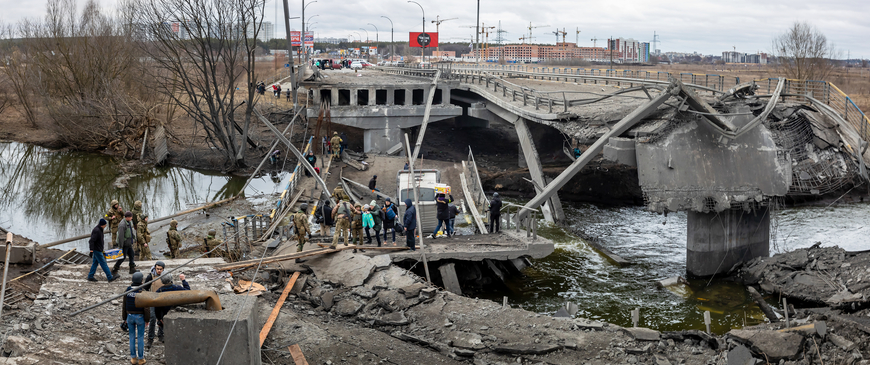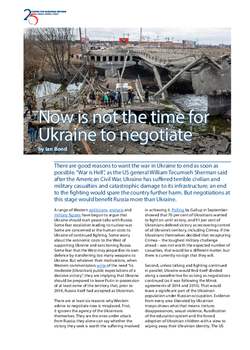
Now is not the time for Ukraine to negotiate
Various Western figures are encouraging Ukraine to begin peace negotiations with Russia. But a ceasefire now would leave Ukraine vulnerable to a renewed Russian attack. Ukraine needs weapons, not wavering.
There are good reasons to want the war in Ukraine to end as soon as possible. “War is Hell”, as the US general William Tecumseh Sherman said after the American Civil War. Ukraine has suffered terrible civilian and military casualties and catastrophic damage to its infrastructure; an end to the fighting would spare the country further harm. But negotiations at this stage would benefit Russia more than Ukraine.
A range of Western politicians, analysts and military figures have begun to argue that Ukraine should start peace talks with Russia. Some fear escalation leading to nuclear war. Some are concerned at the human costs to Ukraine of continued fighting. Some worry about the economic costs to the West of supporting Ukraine and sanctioning Russia. Some fear that the West may jeopardise its own defence by transferring too many weapons to Ukraine. But whatever their motivations, when Western commentators write of the need “to moderate [Ukrainian] public expectations of a decisive victory”, they are implying that Ukraine should be prepared to leave Putin in possession of at least some of the territory that, prior to 2014, Russia itself had accepted as Ukrainian.
There are at least six reasons why Western advice to negotiate now is misplaced. First, it ignores the agency of the Ukrainians themselves. They are the ones under attack from Russia; they alone can say whether the victory they seek is worth the suffering involved in achieving it. Polling by Gallup in September showed that 70 per cent of Ukrainians wanted to fight on until victory, and 91 per cent of Ukrainians defined victory as recovering control of all Ukraine’s territory, including Crimea. If the Ukrainians themselves decided that recapturing Crimea – the toughest military challenge ahead – was not worth the expected number of casualties, that would be a different matter; but there is currently no sign that they will.
Western advice to negotiate now is misplaced. Only Ukrainians can say whether the victory they seek is worth the suffering involved in achieving it.
Second, unless talking and fighting continued in parallel, Ukraine would find itself divided along a ceasefire line for as long as negotiations continued (as it was following the Minsk agreements of 2014 and 2015). That would leave a significant part of the Ukrainian population under Russian occupation. Evidence from every area liberated by Ukrainian troops shows what that means: torture; disappearances, sexual violence, Russification of the education system and the forced adoption of Ukrainian children with a view to wiping away their Ukrainian identity. The US ambassador-at-large for global criminal justice has strongly implied that such war crimes and crimes against humanity, taken together, could amount to genocide. There may be reasons to negotiate with a leader responsible for genocide – like Yugoslavia’s Slobodan Milošević in the 1990s – if the alternatives are worse. But while Ukraine is still advancing, it will not want to leave Russia in a position to continue the ‘de-Ukrainianisation’ of occupied areas.
Third, there is a risk that those pushing for negotiations will increase damaging divisions within the West, when unity is most vital. In her State of the Union address to the European Parliament in September, European Commission President Ursula von der Leyen said: “We should have listened to the voices inside our Union – in Poland, in the Baltics, and all across Central and Eastern Europe. They have been telling us for years that Putin would not stop”. Those that think Ukraine can satisfy Putin’s imperial urges with territorial compromises are again ignoring the views of allies and partners with most reason to fear Russia’s intentions. There is also a risk of friction between Ukraine and its partners. Some in the West may criticise Kyiv as happy to take Western weapons but not Western advice. By contrast, Kyiv may be frustrated that even after nine months of brutal war some of its Western partners are still more concerned that a Ukrainian victory will provoke Putin into using nuclear weapons than they are worried about the effect of a Russian victory on Ukraine and its people.
Fourth, linking pressure on Ukraine to negotiate with Putin’s threats of escalation would set a disastrous international precedent. If the US and its allies back down in the face of nuclear or energy blackmail on this occasion, why would Putin believe they would defend the Baltic States or others in the face of similar Russian threats? And if threatening a nuclear attack enables Putin to protect his territorial gains in Ukraine, a country with no nuclear weapons and outside the protection of the West’s nuclear umbrella, then both aggressive powers and their potential victims will be increasingly motivated to acquire nuclear weapons of their own, either to threaten or to deter.
If threatening a nuclear attack enables Putin to protect his territorial gains in Ukraine, then others will be motivated to acquire nuclear weapons of their own, either to threaten or to deter.
Fifth, offering Putin negotiations, and presumably a pause in fighting when his forces are under pressure, would give Russia the chance to reconstitute its forces and refill its arsenals in preparation for a renewed attack on Ukraine. Putin has believed for a long time that “Ukraine is not even a country”. As long as he is in power, his goal will remain to reunite those he regards as the ‘Russian’ peoples of Ukraine and Russia. If Russia can rebuild its strength, at least partially, while it still occupies a significant part of Ukraine, Putin’s starting point for his next attack will be more advantageous than it was in February. Russia did not use the time after the Minsk agreements to seek a durable peace but to prepare for the next phase of the war; there is no evidence that this time would be different.
Finally, despite the setbacks Russia has suffered so far, there is no sign that Putin himself or those around him are looking for ‘off-ramps’. At the annual Valdai Forum, Putin argued (as he had done on many previous occasions) that Ukraine was an “artificial state” and suggested that “only Russia, which created today’s Ukraine, could be the … guarantor of Ukraine’s statehood, sovereignty and territorial integrity”. This implies he has not given up his objective of controlling the country. Putin sees Western talk of off-ramps as an indication that the West itself is looking for a way out of the conflict, and therefore as a reason for him to apply more pressure. Talk of negotiations now will only reinforce his belief that time is on his side.
This said, the war is still likely to end with negotiations: however successful Ukrainian forces are in the fighting, there is not going to be a ‘victory banner over the Reichstag’ moment, when the Ukrainian flag flies over the ruins of the Kremlin and the remnants of the Russian army surrender unconditionally. But the timing and circumstances of talks will have to be right if the result is to be lasting peace. Negotiations launched now might (or might not) give Ukraine temporary relief; but they would be very unlikely to produce a stable and long-lasting settlement of the conflict. For that, Russia will have to be in a much weaker position.
For Ukraine, there is an element of risk in not seeking a rapid end to the fighting. Perhaps, despite its poor performance since February, the Russian army will mobilise more troops, re-arm and defeat Ukraine in battle next spring. If the West wants to mitigate that risk and bring about a quick end to the war, it should step up its military support to Kyiv. Once Ukraine has achieved a decisive victory on the battlefield, negotiations will be much easier.
Ian Bond is director of foreign policy at the Centre for European Reform.


Comments